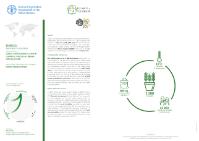Focal point
Location
The Food and Agriculture Organization of the United Nations leads international efforts to defeat hunger. Serving both developed and developing countries, FAO acts as a neutral forum where all nations meet as equals to negotiate agreements and debate policy. FAO is also a source of knowledge and information. We help developing countries and countries in transition modernize and improve agriculture, forestry and fisheries practices and ensure good nutrition for all. Since our founding in 1945, we have focused special attention on developing rural areas, home to 70 percent of the world's poor and hungry people.
Members:
Resources
Displaying 376 - 380 of 5074Success cases and good practices in forest owners' organizations in Eastern European countries
The Bahamas and FAO
The Bahamas became an FAO member state in 1975. Cooperation has focused on strategic development and increased competitiveness of the country’s agriculture and fisheries sector, with FAO interventions comprising policy and legislative support, technical development projects and rehabilitation and emergency assistance. As a flat and small island developing state (SIDS), the Bahamas is very vulnerable to the impacts of climate change, which makes resilience building an important element of cooperation today.
Daegu: mitigating climate change through urban agriculture
In 2012, the City of Daegu launched and financed a paddy rice project in eight busy places of the city, providing additional green areas while simultaneously cooling the hot urban climate during summer time. The harvest is done by thousands of citizens and redistributed to disadvantaged neighborhoods. Study tours are organized in the fields for citizens and children.
Perfil de País – Panamá
Este perfil de país describe el estado de los recursos hídricos y el uso del agua, así como el estado de la gestión del agua agrícola en Panamá. El objetivo de esta monografía es describir las particularidades del país y los problemas encontrados en el desarrollo de los recursos hídricos y el riego en particular.
Post-conflict land tenure using a Sustainable Livelihoods Approach
This paper addresses the application of sustainable livelihood approaches to access to land and land administration in post-conflict situations.











